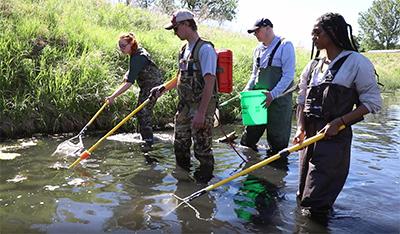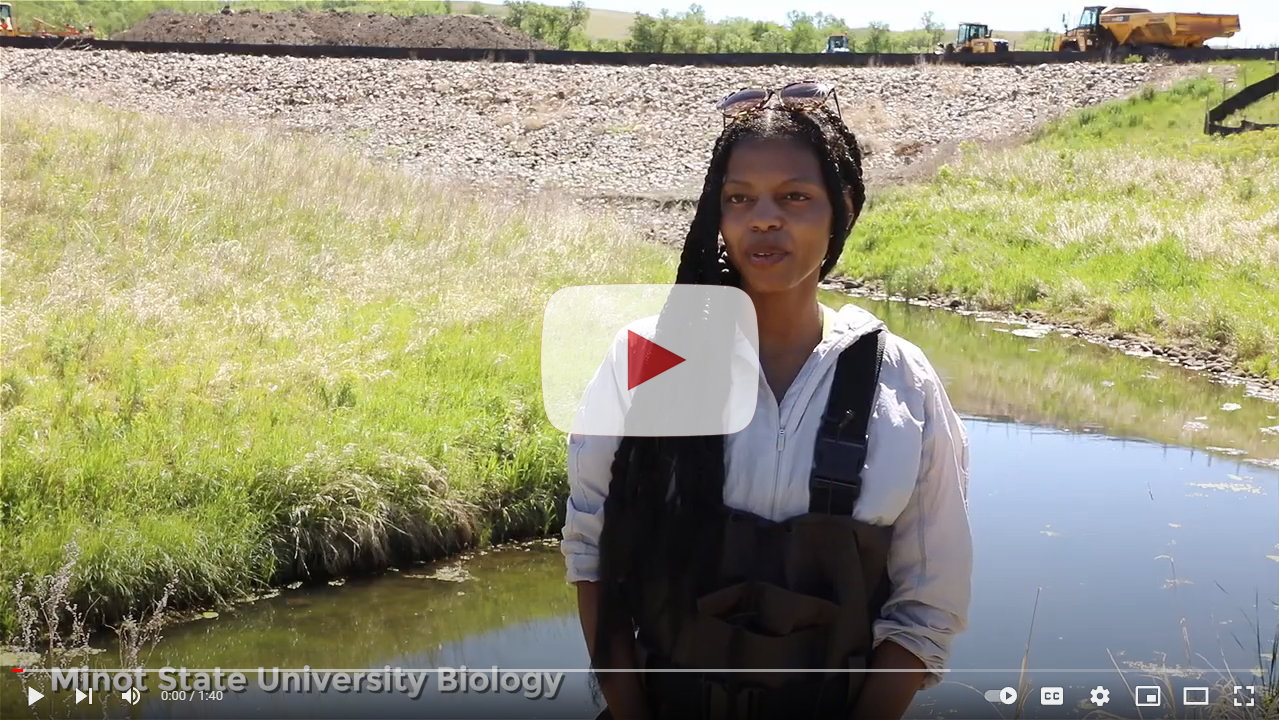
MINOT, N.D. – Minot State University’s Thorpe Halloran, assistant professor of biology, believes in the importance of classroom work.
But in his world, there is nothing better than getting hands-on experience in the field — or in this case — working in streams, rivers, and lakes.
As the University expands its offerings to include a focus in wildlife and fisheries, the Biology Department has added several professors who expertise centers on natural resources. Halloran was the first of several new faculty that were hired to complement and expand the existing biology curriculum.
“The department will certainly continue to have our pre-professional programs that enable students to pursue post-graduate education in medicine, dentistry, veterinarian studies, as well as physical and occupational therapy.” Halloran said. “But there is an innate curiosity about nature, about environment systems, even for our students who are trying for medical school; they want to be exposed to the state’s unique natural resources.
“Fish and wildlife biologists are one of the fasting growing areas in biological sciences. With the newly-created courses in ichthyology, mammalogy, plant systematics and anatomy, and ornithology, the department will be able to offer a variety of organismally-based courses. The curricular focus on terrestrial and aquatic ecosystems is something not currently offered in the western part of our state.”
The department has identified fisheries and wildlife science has an area of expansion in terms of degree options for MSU students. In the past year, the department has added Joseph Pettit, who is an expert in plant ecology as well as Chad Williamson, a wildlife ecologist who investigates interactions among wildlife, their habitats, and people. The addition of these faculty will allow the department to generate a new program where students will be able to select two pathways; fisheries/aquatic sciences or wildlife management and receive professional certification in each area from national organizations if students so chose.
This past spring, the Biology Department secured funding through the North Dakota Established Program to Stimulate Competitive Research (ND EPSCoR) coupled internal university support to purchase a 17-foot electrofishing boat. The boat will be used in ichthyology and freshwater biology courses as well as undergraduate-driven projects.
Halloran began to use the boat this summer with his research students, Geena Broadwater, Sam Paszek, and Hallie Tranby, on local lakes and has plans to expand to areas such as the Missouri River in the future.
“It’s pretty easy to work with on a lake, but the river is a little more challenging and we will need some more practice,” he said. “We had students working with us this summer in local lakes and it has been a great experience interacting with them. For undergraduates interested in securing federal, state and local jobs that focus into national resource management, there is nothing better than having hands-on field training and experience collecting data.”
The goal for Halloran, Pettit and Williamson is to develop a degree track will all its associated courses that prioritizes experiential learning for MSU students.
“We did have one course in the books, freshwater biology, and we had students signed up for that,” he said. “I first taught that during my first semester in Fall 2019 and the interest grew from there. I visited with Paul [Department of Biology Chair Paul Lepp] and said I’d like to teach ichthyology. We are working, as a department, on offering more courses that train developing scientists in working outdoors.”
While Halloran speaks passionately about the subject today, it wasn’t his first thought when attending college. He earned a history degree with a minor in political science from Texas A&M — with maybe one or two biology classes as general education requirements — before working in Houston.
After a couple years in business, he wasn’t happy with his direction in his life and decided to return to school. He undertook multiple courses in biology and then applied for a master’s degree at Texas State University. Halloran’s research there centered on characterizing the foraging dynamics of introduced trout in central Texas.
Upon completion of the master’s degree, Halloran was employed by the National Oceanic and Atmospheric Administration (NOAA) in the Bering Sea, working as a fisheries scientist monitoring landing in large-scale commercial fisheries. He was then hired by NOAA to monitor the commercial tuna fishery and its associated bycatch in the equatorial Pacific. He worked out of Hawaii on smaller boats trips that could last up to three weeks. Finally, NOAA offered Halloran the opportunity to work in the Gulf of Mexico as fisheries biologist in the commercial shrimping industry.
During this time, he decided to pursue a doctorate in fisheries ecology. Halloran enrolled at LSU and completed his doctoral research examining the early life history dynamics of fishes in the Atchafalaya Basin. He also received minors in experimental statistics and oceanography during his time in Baton Rouge. As he wrapped up his dissertation at LSU the Deepwater Horizon accident occurred.
“At the time, the Deepwater Horizon oil spill happened and there wasn’t a lot of work for newly minted PhD.’s in fisheries, so I ended up being a part of a huge group that worked on Deepwater Horizon,” he said.

This experience gave Halloran the chance to collect post-spill data in many areas of the Gulf of Mexico.
Once the surveys of spill were completed, he moved to teaching at Juniata College in southcentral Pennsylvania on a one-year contract that turned into a four-year stint, working in the Environmental Science and Studies department.
“During my time in Pennsylvania, I was able to establish a series of new courses that centered on aquatic resources,” Halloran said. “I worked extensively with students to collect benthic macroinvertebrates and fishes in regional streams; it was an incredibly rewarding experience and it exposed me to teaching undergraduates for the first time.”
He was then given the opportunity by Augsburg University in Minneapolis to plan and travel down the Mississippi River under Joe Underhill, a political science professor. The expedition, using four 20-foot canoes, paddled from Minneapolis to St. Louis over a two-month period. The final sections of the trip were completed in shorter increments as the group reached New Orleans. Classes were taught in tents, laundromats, libraries or anyplace that enabled lecturing. The influence of that trip still resonating today and has shaped Halloran’s desire to have his students learn in the outdoors.
“It was such a great experience, a great trip,” he said. “We were exposed to such daily beautiful on the Mississippi River, I plan on taking MSU students on a week-long paddling trip down the Mississippi during Spring Break next semester.”
He was attracted to Minot State primarily due to the program’s potential.
“I had never been to Minot, but because of the class size and the department, this was in the wheelhouse of what I had to offer,” Halloran said. “I really liked the idea of being able to create courses. When I did my interview, it felt comfortable with the MSU staff and faculty.”
Developing environmentally-focused courses has already led to new equipment and opportunities for MSU students. Halloran believes it is just the start of things to come.
“We went down the Rio Grande in 2020 for biogeography. That trip allowed students to see first-hand deserts and all the resources associated with these unique ecosystems. There will be six to seven courses every academic year that are guaranteed to get our students in the field. My colleagues, Drs. Pettit and Williamson, are also committed to getting students excited about ecology.
“Hands-on training is at the core of what Minot State has to offer.”
About Minot State University
Minot State University is a public university dedicated to excellence in education, scholarship, and community engagement achieved through
rigorous academic experiences, active learning environments, commitment to public service, and a vibrant campus life.
Published: 10/18/21





